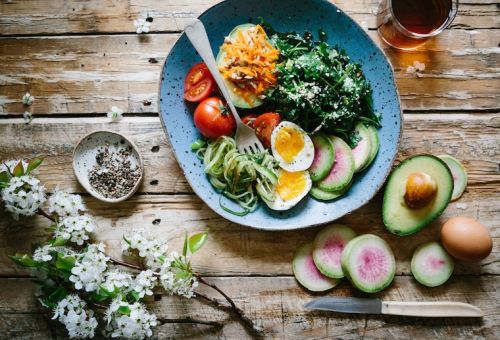Our editors independently select these products. Making a purchase through our links may earn Well+Good a commission
So maybe you relaxed a little too much over your 99 days of summer (hey, we’re all human). Luckily, fall is all about resetting, transitioning out of summer fun mode, and settling into a feel-good routine with your healthy habits.
But with so much info out there, what’s the best approach to getting back on track? Wouldn’t it just be quicker to eliminate all “bad” foods and cut way down on calories? Not so fast.
Before you do something drastic in the quest for ASAP results, holistic health counselor Cassandra Bodzak has some advice—and a word of warning.
“I would caution people who turn to food deprivation as a means of seeing quick results that it’s not sustainable, it can trigger compulsive eating, lack of energy and focus, and generally affect your overall happiness if you are in a constant state of hunger,” Bodzak says.
“I would caution people who turn to food deprivation as a means of seeing quick results that it’s not sustainable.”
On top of those drawbacks, Bodzak notes that drastically changing your serving sizes can trigger a negative cycle that’s seriously tough to break out of. “I find very often that dramatically restricting calories can lead to a vicious cycle of binging or overeating and then restricting again,” Bodzak says. “It becomes a dangerous yo-yo that not only will make you miserable but can be really detrimental to your health.”
As the title of her book—Eat With Intention—suggests, Bodzak supports a more holistic “everything in moderation” approach to food, similar to the approach of Weight Watchers.
In case you haven’t heard of Weight Watchers’ Beyond the Scale program, let us fill you in: The plan is designed to let you enjoy your favorite foods (yes, even chocolate) while also providing intel on how to boost the benefits of a healthy lifestyle. It gives you all the tools to eat better, move more, and cultivate a positive mindset so you can tap into perks like increasing energy, feeling more confident, and losing weight (if that’s one of your goals).
After all, celebrating non-scale victories is a foolproof way to feel good in your own skin. And to help get you started, Bodzak has some simple tips for a healthy fall makeover.
Scroll down for five ways to reboot your health—without going on a calorie crash course.

Listen to your body
First and foremost, Bodzak says, you have to tune inwards. Just because a certain way of eating is popular on Instagram, doesn’t mean it’s going to be popular with your body—so pay attention to which foods make you feel like starting a spontaneous dance party (AKA strong and energized), and which ones leave you in a 3 p.m. food coma (ahem, bloated and lethargic).
“My food philosophy is ‘above all, listen to your body,’” Bodzak says. “I don’t believe in one-size-fits-all nutrition. I think we all have a special combination of dietary needs depending on where we live, the season of our life, food sensitivities, and lifestyle factors.”
Weight Watchers allows that flexibility by letting you be in charge of your food choices, and giving you the tools to make those choices good ones. With that freedom, you can employ Bodzak’s “food detective” method and take time to investigate which foods work best for you.

Have a plan
Whether it’s a Sunday of solo meal prep while you listen to podcasts or a guided program like Weight Watchers, Bodzak believes in the effectiveness of following a meal plan because it gives you a personal roadmap for navigating your relationship with food.
“I think having a healthy eating program is tremendously helpful in releasing emotional patterns and auto-pilot behaviors around food,” Bodzak says. “When we have a plan to follow, we can stop obsessing or analyzing food, have healthy meals planned in advance and rig ourselves for success on every level.”
Weight Watchers’ Smart Points food plan assigns points to different foods based on calories, protein, sugar, and saturated fat content. That makes it simple to figure out your personalized healthy game plan for the day—and know exactly how many happy hour hors d’oeuvres you can munch on while still getting the nutrients you need.

Don’t give food labels
Despite the positives of allowing yourself a night to munch on whatever you want (especially while watching Friends reruns during girls nights), Bodzak isn’t into the concept of the cheat meal.
“I don’t like calling certain meals ‘cheat meals’ because it almost makes them more enticing, like you’re having a naughty, delicious treat,” Bodzak says.
Instead, she advises mindfully enjoying your fave snacks every once in a while so it’s easier to return to your nutritious fare—and you don’t feel like you’re living in a bleak, pizza-free world.
“The main problem with deeming certain foods ‘bad’ and then cutting them out, or restricting calories dramatically, is that it triggers a cycle of binging often and makes it so much more likely that you won’t stick with it,” Bodzak says. “When we deprive ourselves in such a big way, we make our new healthy lifestyle feel more like a punishment.”

Recruit an accountability squad
How many times have you texted a message like this to your BFF?: “I totally would have slept through that 6 a.m. HIIT class if I didn’t know you’d be there.”
Following through on your intentions to live a healthier life (instead of hitting snooze) is easier when you have support, which is why Bodzak stresses the importance of finding an accountability partner (or two) to help you stick to your game plan.
“When you’re making changes around your daily habits (which is always the case when you’re looking to improve your wellbeing) it can be incredibly helpful to have a running buddy, support group, or coach,” Bodzak says. “It’s not easy to make big shifts, and having that support can make all the difference when it comes to sustaining it long term.”
With Weight Watchers, you have access to a whole squad of likeminded people who will be cheering you on via the Connect platform in the app. The community-focused social network is a safe space to ask questions, search for inspo, find bad day encouragement, and of course, share food photos (think: Instagram specifically for people who share your healthy-living aspirations). Talk about #squadgoals.

Be patient
If you eat a salad for dinner and don’t wake up bursting with energy the next morning, don’t be discouraged. Cultivating good-for-you patterns isn’t instantaneous—and it will take a while before you become obsessed with that new vinaigrette recipe.
“Everyone will see results in a different time line depending on the amount of weight they need to lose, how differently they were eating before, and various other lifestyle factors that contribute,” Bodzak says. “I always tell people to try everything for at least a month. By then you should notice at a minimum an increase in energy and vitality.”
More energy and vitality? That’s serious #fallgoals.
In partnership with Weight Watchers
Top photo: Stocksy/Kate Daigneault
Sign Up for Our Daily Newsletter
Get all the latest in wellness, trends, food, fitness, beauty, and more delivered right to your inbox.
Got it, you've been added to our email list.





